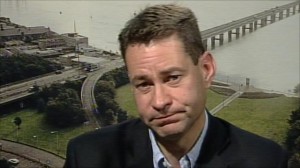
The main political parties in the UK have just finished up their annual conferences, and by and large, they were rather dull affairs this time around. However, along the fringes of the Conservative Party conference, the Scottish branch was preparing to, possibly, go out of business.
The Tories in Scotland, officially known as the Scottish Conservative & Unionist Party, are in the middle of a leadership contest. One of the candidates, Murdo Fraser, has said that the party has no future and needs to be replaced by a new right-wing party north of Hadrian’s Wall. While a great many party members disagree, it says something when a candidate for the top job says that closing down is the best option.
Two factors have brought the Scottish Conservatives to this position. First was the misery that Thatcherism brought to Scotland. Auto workers, miners, shipbuilders and steel workers in Scotland saw their jobs go away to be replaced by nothing. Unemployment hit 25%. When Prime Minister Thatcher considered imposing a poll tax to deal with local funding, she opted to test it on Scots before the rest of the UK. In the general elections of 1979, 1983 and 1987, Labour won a majority of seats in Scotland – to many Scots, hers was an occupation government. In 1997, Scotland elected 72 Members of Parliament. Not a single one was a Tory. In 2001, 2005 and 2010, the party won exactly 1 seat at Westminster.
The other factor was the referendum on devolution held September 11, 1997, when Scots decided that their own parliament would be a good idea after going about 300 years without one. Since the referendum, the Scottish Parliament has handled most local affairs and has some taxation powers. The referendum’s “yes” vote was a huge victory for the Scottish National Party (SNP), which officially backs independence, and for the Liberal Democrats, who tend to favor a federal Britain.
With some power devolved to Edinburgh, the Conservatives and Labour have still handled Scotland from London. And this failure to grasp the implications of devolution has hurt both. In the last Scottish election, the SNP got a lot of mileage out of “London Labour.” Although the Scottish Parliament has proportional representation rules that were designed to create coalition governments, this approach was so effective that the SNP won a majority of seats in Edinburgh last year.
The Labour Party has just announced plans to let its Scottish branch have greater autonomy as a result of the electoral drubbing. Jim Murphy, MP, said of the Labour Party’s decision, “This is about turning the Scottish Labour Party into Scotland’s Labour Party. Today, we are completing the devolution of the Scottish Labour Party. From now on, whatever is devolved to the Scottish Parliament will be devolved to the Scottish Labour Party.”
The Conservatives, however, fought against devolution, and in their hearts, they believe in a unitary state for the four parts of the UK (England, Scotland, Ulster and Wales). So, devolving power to their Scottish branch runs into ideological issues. Moreover, the Tories don’t have the reserve of goodwill that Labour enjoys. Labour is still seen in many parts of Scotland as the party that tried to stop Mrs. Thatcher; the fact that it failed is not relevant. The Conservatives are seen as an anti-Scottish party in parts of the north.
Mr. Murdo’s proposal is a radical one, but the situation is dire. When a party that supports the ideas of Adam Smith and John Calvin can’t get votes in Scotland, maybe the issue really is a branding problem. Conservatism with a Scottish face is likely to have a better chance than the same ideology with the English accent (Eton and Oxford at that) of David Cameron. Then again, Scotland just might be a left-of-center nation, and the 15% or so that the Conservatives win at election time is about all they will ever win.